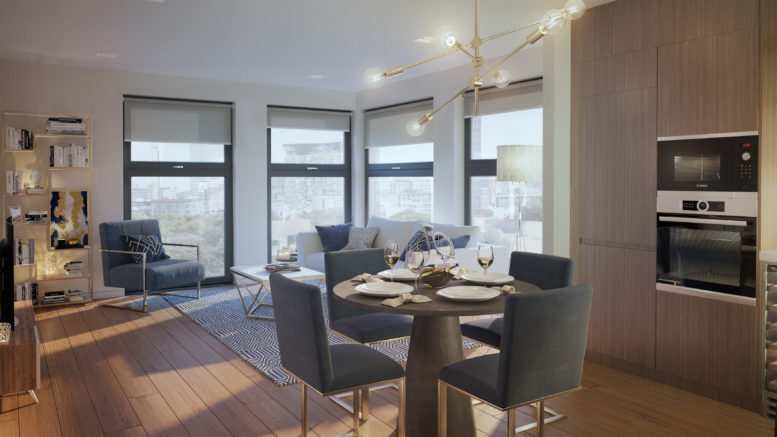With strong infrastructure, good business, a burgeoning population and improved connectivity, Birmingham couldn’t have expected more in 2017 and the developments of last year have put it in good stead for continued success in 2018 and beyond. Birmingham is now a recognized property investment destination and here are ten reasons why now is the best time to buy a property there:
1. Business Hotspot
Birmingham submitted a stellar report card in 2017 and had an outstanding 2018 so far. Indeed, since 2017, Birmingham has been “rising” in every sense of the word. Total investment in the city reached £1.1 billion per annum. To put this figure into perspective, consider that the total investment for the West Midlands is currently £2.4 billion, which means that over 45% of this fortune was contributed by Birmingham alone. 30% of the £1.1 billion came from overseas investors, proving that Birmingham’s appeal reaches beyond English shores. Major global corporations have recognized its potential and a selection of these have elected Birmingham as their headquarters for the UK over the past few years, Lloyds Bank, Deutsche Bank and HSBC to name a few. And this is likely to accelerate and attract more businesses as the number of active businesses in the city is up 13.5%, that’s three times UK’s national average growth rate and is as it is geared to become the fastest growing economy of any city region.
2. Diversified Economy
It is undeniable that the West Midlands and Birmingham are showing great prospects but a diversified economy ensures its sustainability in the long run. Besides being one of the largest financial services clusters in Europe, home of global banks, insurance and accounting firms, the West Midlands is also one of the largest innovation centres in the UK. It is making headways in low carbon technologies and energy storage (world-class university-led research in Coventry), the food processing industry (with Mondelez International global research and development center located in Birmingham), has the largest concentration of materials-related jobs in the entire country, is the pioneer in 5G networks and is one of the most prolific creators in the fintech, gaming and AI industries in the UK. R&D also extends to the aerospace industry (25% of the sector is located in the region) and the automotive industry (60% of the automotive R&D is done in Greater Birmingham). This growing diversified economy attracts companies and talents alike making the West Midlands the “New Growth Capital” of the UK.
3. Big City – Big Plans
The Big City Plan, which Birmingham city’s officials unveiled in 2010, is well and truly in motion, and it is starting to achieve what it set out to do – rejuvenate Birmingham’s city center in order to attract new businesses and residents. One of the largest recent office transactions was the £265 million purchase of part of Brindleyplace by HSBC Alternative Investments as it completed the relocation of its headquarters from London to its Birmingham new home at Arena Central. And while the bank’s expensive move may be the most headline-grabbing one, it most certainly wasn’t the only company that has chosen to reduce operations in London in favour of Birmingham last year. HSBC’s move followed hot on the heels of Deutsche Bank, which relocated 500 employees from the capital city to Birmingham. With wage levels rising faster than anywhere else in the UK, Birmingham’s authorities have the ambition of creating 500,000 more jobs by 2030.
4. Major Infrastructure Investments
In addition to the £550m renovation of Birmingham New Street Station, which now serves 170,000 passengers per day and has become a luxury retail destination (Grand Central), major regeneration investments in the pipeline include £500m for Paradise Birmingham, currently under construction, which will link the traditional business district of Colmore Row with the new business and financial center around Arena Central & Brindleyplace; £500m for the upcoming Smithfield Market regeneration that will include new museums, art galleries and music venues as well as 1,000 new homes and create up to 3,000 new jobs; the £1b regeneration of Longbridge in the south of Birmingham and the £1.2b investment in the eastern area of the city center, where the HS2 station at Curzon will be located.
5. A Connected City
With two stations of the high-speed rail being planned for central Birmingham (by 2026), the building of the train route is itself a vote of confidence from the central government for Birmingham. The High Speed 2 (HS2) is a planned high-speed railway in the UK aimed to be the new backbone of the national rail network, linking London, Birmingham, the East Midlands, Leeds and Manchester. Birmingham’s historic Curzon Street station is currently awaiting its transformation into a seven-platform HS2 terminal, complete with a 350-acre site around it that houses shops, offices, a hotel and 2,000 residential units. City officials are hoping that the Curzon Street transformation will mirror the success seen at New Street Station, which, in 2017, reopened as an impressive entry point into Birmingham with extensive retail spaces including British high-end department store John Lewis as an anchor tenant. This is not the only initiative taken by the authorities, who are enfolding an ambitious plan extending the West Midlands Metro network within the city core, the Greater Birmingham areas and its neighboring cities, an integrated network that will be delivered between 2019 to 2026. Besides light and high-speed railway, Birmingham also enjoys the largest bus network outside of London.
6. Top Performer
Birmingham’s residential property market shares the top spot for the strongest house price growth with Edinburgh, beating even Manchester and Liverpool, with a staggering 7.5% growth year-on-year according to Hometrack UK Cities House Price Index. With new investments comes job creation, and with new jobs, come new residents. This means Birmingham needs to accommodate a much larger pool of households, especially in the city center. This is driving house prices up. This explains why home prices in Birmingham have seen a steady annual growth since mid-2015, and now, Knight Frank forecasts an acceleration with capital appreciation in the residential sector of 18.4% over the 2018-2022 period, while Jones Lang LaSalle predicts 20.5% over the same period. Birmingham also rank on top of the charts in terms of rental yields, with average yields exceeding 6% in the city centre. Knight Frank predicts Birmingham will see a projected rental income growth of 15.4% between 2018 and 2022, Jones Lang LaSalle forecasting a 16.5% increase in rental income by 2022. Birmingham is truly a top performer.
7. Room for Growth
According to Rightmove, the UK leading property media, Birmingham blended average residential property prices equated £225,383 as of September 2018. These remain significantly more affordable compared to London (about 60% cheaper): prices for new developments in central London currently range between £1,000 and £2,000 psf, while properties in central Birmingham now command £390 to £450 psf. The difference is especially significant when considering that, as a business hub, Birmingham is fast becoming comparable to the capital. In other words, it has all the opportunities and infrastructure without the corresponding price levels. However, the price difference with cities like Manchester is now closing and Jones Lang LaSalle expect house prices to reach the £500 psf mark by 2020. The savvy property investors will therefore need to make their decision fast to benefit from this fast growth.
8. Supply & Demand
Most of the largest cities in the UK are currently facing a shortage in housing, and Birmingham is no different. This spells plenty of investment opportunities for developers and investors. According to the latest national population projections, the population of Birmingham is expected to rise by 171,000 to hit 1.3 million in 2039, meaning at least 4,461 new homes need to be built every year to meet the demand. For example, Hong Kong-based Top Capital Group are working alongside UK based Court Collaboration, and are currently in the midst of completing two luxury residential developments, The Axium and Arden Gate, both located in prime locations in Birmingham’s business and retail districts, near the brand new Grand Central / New Street Station. Upon completion, both properties will deliver 529 residential units joining the 3,500 currently in the development pipeline in Birmingham city centre. While this will help closing the gap, it is far from meeting the demand.
9. Education
Birmingham is currently home to five major universities: Aston University, Birmingham City University, University of Birmingham, Newman University and University College Birmingham, all of which are well-regarded institutions that occupy top spots in international rankings. Considering Birmingham’s population of just slightly over one million, this number of tertiary institutions is undoubtedly disproportionately large compared to other major cities. As one of the youngest cities in Europe, with 40% of its population under 25 years of age, the city hosts 110,000 students including 32,000 research students. With such a significant student population and impetus for growth in the education sector, it is not difficult to imagine that the buy-to-let market in Birmingham is a lucrative one. Developers, from the UK and overseas, have already identified its potential, and many have staked their claims on prime spots in the city center with projects building strong interest among local, national and international property investors.
One such developer is Hong Kong-based company Top Capital Group with its three residential developments in Birmingham, The Axium, Arden Gate and Nautical Club. The former two developments sit on prime real estate within the core city center and walking distance from New Street Station, the rail station that have convenient connections to the Eastside area and its universities. These projects feature high specifications one- and two-bedroom apartments suitable for professionals working in the city centre as well as student tenants looking for quality city centre living.
10. Quality of Life
According to a recent report by PwC and thinktank Demos ranking global cities quality of life, Birmingham is the fastest improving city to live and work in the UK, based on factors such as transportation, inequality, work-life balance, health and income levels. In a similar report by Mercer, Birmingham ranks higher in terms of quality of life than Los Angeles, Rome, Osaka, Shanghai and Dubai. It is no surprise that Birmingham is the number one destination for those leaving the capital. Birmingham has over 8,000 acres of parks and open spaces making it one of the greenest cities in the UK and also has more miles of canals than Venice. The city is also fast becoming the food capital of the UK with more Michelin-starred restaurants than anywhere else outside of London and a vibrant gastropub scene. Finally, Birmingham is offering a vast array of cultural activities, with notably its world-renowned Symphony Hall or the Birmingham Hippodrome, one of the largest theaters in the UK. Considering the upcoming infrastructure projects, this is only a start as the city will be hosting the Commonwealth Games in 2022. This will not only drive Birmingham’s profile as an investment, work and touristic destination, but also propel its booming property market.
To find out more about the property market in Birmingham, the UK proud second city, discover the latest property investment opportunities in the heart of city, you can contact our sales team Court Living at living@courtcollaboration.com or join us at any of our upcoming events:







Be the first to comment on "Ten Reasons Why Now is the Best Time to Buy a Property in Birmingham"